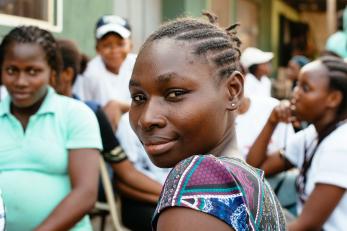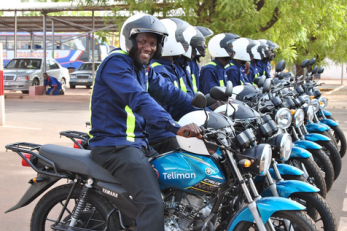Breadcrumb
Teliman: Paving the road to opportunity in Mali

Africa has a large and rapidly growing population of young people searching for work.
Between 10 to 12 million African youth enter the workforce each year, but only 3.1 million new jobs are created, leaving millions unable to realize their full potential.

The consequences are pervasive and severe. Youth unemployment leads to poorer living conditions, conflict, and migration. Jobs are not just sources of income — they provide a sense of well-being and purpose. Without the promise of work, the future of Africa’s youth hangs in the balance.
Meanwhile, Africa’s commuters grapple with an increasingly inefficient and overwhelmed public transportation sector. This is perhaps nowhere more apparent than in Mali's capital, Bamako, where a growing population is putting mounting pressure on the city's road network. The daily commute for most is either too expensive (via taxi) or uncomfortable and slow (via bus or van).
At the intersection of these challenges is the opportunity for a shared solution — one that provides a new, more efficient mode of transport and new employment opportunities for youth at the same time.
Fueling a brighter future for youth in Mali
Launched in May 2018, Teliman is the very first motorcycle-taxi service in Bamako — offering a solution that is five times faster than vans and four times cheaper than taxis.
Passengers can request rides through Teliman’s call center or via mobile app, which are assigned to the driver in closest proximity, much like Uber or Lyft.

Teliman trains young people to ride the motorbikes and provides drivers with safety gear (for both driver and passenger) as well as licensing and insurance. Young people are also offered the opportunity to own the bikes. Drivers help pay towards their lease over a two-year period, at which point the bike is fully paid off and ownership transferred.
To date, Teliman has onboarded 120 drivers who have completed more than 60,000 trips around the city. The solution is threefold — Teliman is helping Malians travel around Bamako, while providing youth with a new route to income and the chance to own an asset.
Building connections for greater impact

Africa’s youth hold tremendous potential for driving economic growth across the continent. But there’s a severe shortage of decent work opportunities.
We are committed to helping young people find the road to a brighter, more productive future — for themselves, their families and their greater communities.
Through Teliman, we will help link Mali’s youth to a unique track for growth — to own a motorbike, access employment, increase their income and improve their livelihoods. We also see the potential for this model to be scaled to create more sustainable work options in other countries in sub-Saharan Africa.